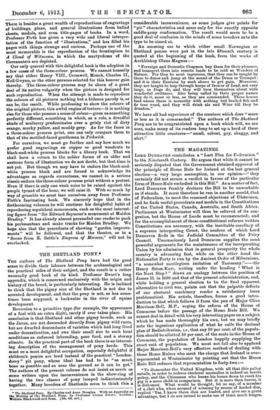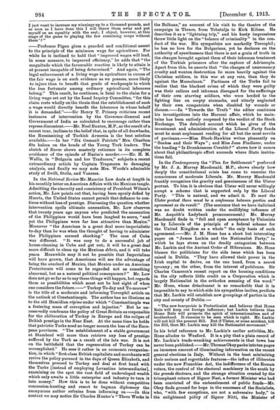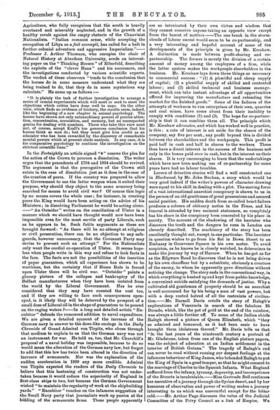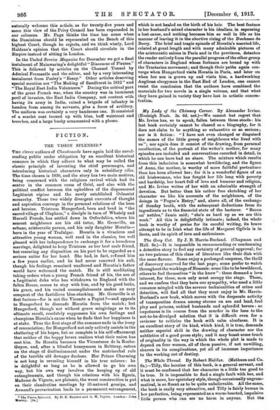THE MAGAZINES.
LORD DUNRAVEN contributes a "Last Plea for Federation "
to the .Nineteenth. Century. He argues that while it cannot be seriously disputed that the Government obtained approval of the principle of Home Rule for Ireland at the last general election—a very large assumption, in our opinion—" they certainly did not secure a verdict in favour of the particular form of Home Rule embodied in this Bill." As a matter of fact, Lord Dunraven frankly declares the Bill to be unworkable as if stands. It must therefore be run in another mould, that of Federalism, to meet the reasoned objections of Ulstermen, and he finds useful precedents and models in the Constitutions of the United States, Canada, Australia, and South Africa. Parliament at Westminster will thus be relieved of its con- gestion, but the House of Lords must be reconstructed; and for the accomplishment of these constitutional reforms written Constitutions are necessary, with the inevitable corollaly of a supreme interpreting Court, the nucleus of which Lord Dunraven finds in the Judicial Committee of the Privy Council. Unconsciously Lord Dunraven supplies the most powerful arguments for the maintenance of the incorporating Union by his admission that in general prosperity the whole country is advancing fast, while on the other hand the Nationalist Party is run by the Ancient Order of Hibernians, "a somewhat sacrilegious imitation of Tammany."—Sir Henry Seton-Karr, writing under the heading "What is the Next Step ? " draws an analogy between the position of James Il. in 1688 and that of the present administration, and, while holding a general election to be the final apparent alternative to civil war, points out that the palpable defects of our electoral machinery render a satisfactory issue problematical. His article, therefore, forms a good intro- duction to that which follows it from the pen of Major Clive Morrison-Bell, M.P., urging the reform of the House of Commons before the passage of the Home Rule Bill. We cannot deal in detail with his very interesting paper on a subject which be has made thoroughly his own, but we may briefly note the ingenious application of what he calls the decimal plan of Redistribution, i.e., that any 10 per cent. of the popula- tion should be allotted 10 per cent. of the seats in the House of Commons, the population of London happily supplying the exact unit of population. We must not fail also to applaud Major Morrison-Bell's very effective method of dealing with those Home Rulers who meet the charge that Ireland is over- represented at Westminster by pointing out that the Home Rule Bill reduces that representation to forty-two :—
" To dismember the United Kingdom, with all that this po:icy entails, in order to redress electoral anomalies is indeed an heroic policy, and the Chinaman who burns his house down to roast his pig is a mere child in comparison. But it is more than heroic. it is dishonest. What would be thought, let us say, of a member of a club who, when accused of 'winning by means of loaded dice, replied 'Yes, I know these dice are loaded, and give me a great advantage, but I do not intend to make use of them much longer,
I just want to increase my winnings up to a thousand pounds, and as soon as I have done this I will throw them away and put myself on an equality -with the rest; I object, however, at this stage of the game to playing the few remaining coups without them' ? "
—Professor Pigou gives a guarded and conditional assent to the principle of the minimum wage for agriculture. For while he is inclined to hold that "improved wages will lead, in some measure, to improved efficiency," he adds that "the magnitude which the favourable reaction is likely to attain is at present incapable of being determined." And again, "The legal enforcement of a living wage in agriculture in excess of the fair wage is on such evidence as we possess, more likely to injure than to benefit that grade of workpeople to which the less fortunate among ordinary agricultural labourers belong." This result, he continues, is fatal to the claim for a living wage set out by the Land Inquiry Committee, "for this claim rests wholly on the thesis that the establishment of such a wage would directly benefit the labourers in whose behalf it is demanded."—Sir Henry T. Prinsep criticizes recent instances of intervention by the Governor-General and Government of India as calculated to encourage rather than repress discontent.—Mr. Noel Buxton, M.P., as the result of a recent tour, inclines to the belief that, in spite of all drawbacks, the Russianizing of Turkish Armenia is the best solution available.—In her "Six Osmanli Patriots" Mrs. Charlton fits haloes on the heads of the Young Turk leaders. The sketch of Enver shows masterly reticence in its complete avoidance of the episode of Nazim's murder.—Mr. H. M. Wallis, in "Bulgaria and her Traducers," subjects a recent extraordinary article by Captain Trapmann to damaging analysis, and finally we may note Mrs. Woods's admirable study of Swift, Stella, and Vanessa.
In the National Review Mr. Maurice Low deals at length in his monthly letter on American Affairs with the Mexican tangle.
Admitting the sincerity and consistency of President Wilson's action, Mr. Low points out that, having been openly defied by Huerta, the United States cannot permit that defiance to con- tinue without loss of prestige. Discussing the question whether intervention spells ultimate, annexation, Mr. Low observes that twenty years ago anyone who predicted the annexation of the Philippines would have been laughed to scorn, "and yet the Philippines were far less attractive than Mexico." Moreover "the American is a great deal more imperialistic to-day than he was when the thought of having to administer the Philippines seemed shocking." The case of Cuba was different. "It was easy to do a successful job of house-cleaning in Cuba and get out; it will be a great deal more difficult to clean up the Mexican debris, and it will take years. Meanwhile may it not be possible that Imperialism will have grown, that Americans will see the advantage of being the overlord of Mexico, that Mexico under an American Protectorate will come to be regarded not as something abnormal, but as a natural political consequence P" Mr. Low does not go so far as to say these things will happen, but regards them as possibilities which must not be lost sight of when one considers the future.—" Turkey To-day and To-morrow" is the title of a moderate and informing Turcophil article on the outlook at Constantinople. The author has no illusions as to the old Hamidian regime under which "Constantinople was a festering mass of corruption and injustice." But he un- reservedly condemns the policy of Great Britain as responsible for the obliteration of Turkey in Europe and the eclipse of British prestige in the Near East, At the same time he holds that patriotic Turks need no longer mourn the loss of the Euro- pean provinces. "The establishment of a stable government at Stamboul will more than retrieve any loss of prestige suffered by the Turk as a result of the late war. It is not on the battlefield that the regeneration of Turkey can be accomplished." He sees it rather in an economic reorganisa- tion, in which "first-class British capitalists and merchants will revive the policy pursued in the days of Queen Elizabeth, and themselves proceed to Turkey and deal at first hand with the Turks [instead of employing Levantine intermediaries], examining on the spot the vast field of undeveloped wealth which only awaits a little enterprise and industry to turn it into money." How this is to be done without competitive concession-hunting and resort to bagman diplomacy the anonymous author refrains from informing us.—In this context we may notice Sir Charles Hunter's "Three Weeks in the Balkans," an account of his visit to the theatre of the campaign in Thrace, from Tchatalja to Kirk Kilisse. He describes it as a "lightning trip," and his hasty impressions throw little light on the "balance of criminality" in the con- duct of the war. His sympathies are markedly Turcophil ; he has no love for the Bulgarians, yet he declares on the authority of eyewitnesses that there is not a grain of truth in the charges brought against them of their inhuman treatment of the Turkish prisoners after the capture of Adrianople. Apart from this, he asserts that "the charges of unnecessary cruelty and wanton destruction lie more heavily against the Christian soldiers, in this war at any rate, than they do against the Mussulman." Partisans of the Turks fail to realize that the blackest crime of which they were guilty was their callous and inhuman disregard for the sufferings of their own starving soldiers, who were herded to the fighting line on empty stomachs, and utterly neglected by their own compatriots when disabled by wounds or disease.—In "Towards the Truth" the editor continues his investigations into the Marconi affair, which he main- tains has been entirely reopened by the verdict of the Stock Exchange. The detailed account which he gives of the investment and administration of the Liberal Party funds must be most unpleasant reading for all but the most servile of partisans.—Miss Black-Hawkins writes pleasantly on "Snakes and their Ways " ; and Miss Jane Findlater, under the heading "Is Drunkenness Curable P" shows how it comes about that philanthropic effort succeeds where State institu- tions fail.
In the Contemporary the "Plea for Settlement" preferred by Mr. J. A. Murray Macdonald. M.P., shows clearly how deeply the constitutional crisis has come to exercise the consciences of moderate Liberals. Mr. Murray Macdonald frankly recognizes the gravity and genuineness of the Ulster protest. To him it is obvious that Ulster will never willingly accept a scheme that is supported only by the Liberal Party. " Thia is natural, and we admit it. To meet the Ulster protest there must be a conference between parties and agreement as its result." (The sentence that we have italicized was no doubt written under the mollifying influence of Mr. Asquith's Ladybank pronouncement.) Mr. Murray Macdonald finds in "full and open acceptance by Unionists as by Liberals of the principle of a federal scheme for the United Kingdom as a whole" the only basis of such agreement.—Mr. J. M. Hone has a short but interesting paper on "James Larkin and the Nationalist Party," in which he lays stress on the deadly antagonism between Mr. Larkin and the Ancient Order of Hibernians. Mr. Hone blames the politicians for the side issue which has been raised in Dublin. "They have allowed their power in the Irish capital to derive, on the one hand, from a secret tyranny ; on the other, from the interest of publicans. Sir Charles Cameron's recent report on the housing conditions in the city reflects little credit on a Corporation which is largely Nationalist in the orthodox meaning of the word." Mr. Hone, whose detachment is so remarkable that it is impossible to say to which side his sympathies incline, predicts that Mr. Larkin will establish new groupings of parties in the city and county of Dublin :—
"The new bourgeoisie is Protectionist and believes that Home Rule will keep out foreign influence; but Larkin believes that Home Rule will promote the spirit of internationalism and of brotherhood. It remains to be seen which is right. Mr. Larkin will not kill the present Bill. But if Ulster, or some accident, kill the Bill, then Mr. Larkin may kill the Nationalist movement."
In his brief reference to Mr. Larkin's earlier activities, Mr. Hone alludes to Wexford. It is a pity that a plain record of Mr. Larkin's trade-wrecking achievements in that town has never been published.—Mr. Thomas Okey packs into ten pages an immense amount of illuminating information on the recent general elections in Italy. Without in the least minimizing their serious and regrettable features—the influx of illiterates under the new Franchise Act, the indifference of the Roman voters, the control of the electoral machinery in the south by the grancls electeurs, and the strange situation created by the triumphant return of Signor Nasi, a former Minister who had
been convicted of the embezzlement of public funds—Mr. Okey finds ground for hope in the successes of the Socialists, who, "with few exceptions, are not a subversive body," in the enlightened pOliey of Signor Nitti, the Minister of•
Agriculture, who fully recognizes that the south is heavily overtaxed and miserably neglected, and in the growth of a healthy revolt against the empty rhetoric of the Chauvinist Nationalists. "Italian common sense, while accepting the occupation of Libya as a fail accompli, has called for a halt in further colonial adventure and aggressive Imperialism."— Professor J. Arthur Thomson, who occupies the chair of Natural History at Aberdeen University, sends an interest- ing paper on the "Thinking Horses" of Elberfeld, describing the exploits of the "clever Hans" and his successors, and the investigations conducted by various scientific experts. The verdict of these observers "tends to the conclusion that the horses do in some measure understand what they are being trained to do, that they do in some mysterious way calculate." He sums up as follows :—
• "It is plainly the task of further investigation to arrange a series of crucial experiments which will meet or seek to meet the objections which critics have done well to urge. On the other view, which finds no evidence of trickery, the results seem, indeed, like the beginning of a new chapter in animal psychology. The horses have shown not only extraordinary powers of precise atten- tion, concentration, association, and memory, but an unsuspected genius for dealing with numbers. Those who take this view need not, of course, accept Krall's too generous conclusion that his horses think as men do ; but they must give him credit as an educator who has been rewarded by the discovery of remarkable mental powers which at present elude analysis. In any case, it is for comparative psychology to continue the investigation on the strictest scientific lines."
In the Fortnightly an article signed "4." renews the plea for the action of the Crown to procure a dissolution. The writer urges that the precedents of 1784 and 1834 should be revived. The argument is that the prerogative of the Crown still exists in the case of dissolution just as it does in the case of the creation of peers. If the country was prepared to allow the Government to use the latter weapon when it suited their purpose, why should they object to the same armoury being searched for means to avoid civil war P Of course this logic by no means covers the whole case ; for instance, in creating peers the King would have been acting on the advice of his Ministers; in dissolving Parliament he would be acting alone.
—" An Outsider" writes on the conciliation of Ulster in a manner which we should have thought would now have been impossible even for the most servile of party Liberals, such as he appears to be. Such futile arguments as these are brought forward : "As there will be no attempt at religious or civil persecution, there can be no objection to any safe- guards, however unnecessary, that the Covenant Party may devise to prevent such an attempt." For the Nationalists only want the cordial co-operation of Ulster. It seems hope- less when people write in this way and refuse to look facts in the face. The facts are not the possibilities of the insertion of paper guarantees, which all experience has shown to be worthless, but the certainty that if Home Rule is forced upon Ulster there will be civil war. " Outsider " paints a gloomy picture of the collapse and bankruptcy of the Belfast manufacturers when they have been isolated from the world by the Liberal Government. Has be ever considered that they may have counted the cost too, and if they are willing to face such consequences open- eyed, is it likely they will be deterred by the prospect of a small dose of Liberal oil in the shape of guarantees to be poured on the raging waters P—In a long and detailed article " Ex- cubitor " defends the rumoured addition to naval expenditure.
We are given a detailed account of the increase of the German navy in answer to the dove-like cooings in the Daily Chronicle of Grand Admiral von Tirpitz, who chose through that medium to explain to us that the German navy was not an instrument for war. He told us, too, that Mr. Churchill's proposal of a naval holiday was impossible, because to do so would mean the alteration of the German navy law, but forgot to add that this law has twice been altered in the direction of increase of armaments. Nor was the explanation of the sudden acceleration in 1909 any more credible. Admiral von Thpitz expected the readers of the Daily Chronicle to believe that this hastening of construction was not under- taken because it would reduce the superiority of England in first-class ships to two, but because the German Government wished "to maintain the regularity of work at the shipbuilding yards." " Excubitor " touches on the infamous suggestion of the Small Navy party that journalists work up panics at the bidding of the armaments firms. These 'people apparently are so intoxicated by their own virtue and wisdom that they cannot conceive anyone taking an opposite view except from the basest of motives.—The one break in the storm- clouds of labour unrest would seem to be co-partnership, and a very interesting and hopeful account of some of the developments of the principle is given by Mr. Kershaw. A distinction is made between profit-sharing and co-
partnership. The former is merely the division of a certain amount of money among the employees of a firm, while the latter system makes the workpeople shareholders in the business. Mr. Kershaw lays down three things as necessary to commercial success : "(1) A plentiful and cheap supply of capital; (2) a plentiful supply of skilled and contented labour ; and (3) skilled technical and business manage- ment, which can take instant advantage of all opportunities offered for improving the manufacture and extending the market for the finished goods." Some of the failures of the attempts of workmen to run enterprises of their own, quarries and coal mines, have come about from their inability to comply with conditions (1) and (3). The hope for co-partner- ship is that it can combine them all. The principle which Mr. Kershaw advocates, and which has worked well in practice, is this : a rate of interest is set aside for the shares of the company, say five per cent., any profit beyond this is divided between the shareholders and the workpeople. This profit is paid half in cash and half in shares to the workers. These thus have a direct interest in the success of the business not only in the bonus paid over in cash, but in the interest on their shares. It is very encouraging to learn that the undertakings which have now been making use of co-partnership for some years have had no labour troubles.
Lovers of detective stories will find a well constructed one in Blackwood, by Mr. John Buchan, a story which would be very good indeed if the writer's powers of character-drawing were equal to his skill in dealing with a plot. The moving force of a vast international anarchist conspiracy is shown to us in the person of an old gentleman of great possessions and assured social position. His sudden death from so-called heart failure produces a column of obituary notice in the Times, and his funeral is attended by two eminent statesmen, so completely has his share in the conspiracy been concealed by his place in society. The account of the shadowing of the barrister who discovers the truth and the dangers he runs in London are cleverly described. The machinery of the story has been excellently thought out, except in one particular. The banister in question wishes to go from his flat in Down Street to an Embassy in Grosvenor Square in his own motor. To avoid suspicion, as he knows he is closely watched, he determines to make the journey by way of Harrow. When he has got as far as the Edgware Road he discovers that he is not being driven by his own chauffeur but by a substitute, obviously a creature of the enemy, to whom he apparently gave directions without noticing the change. The story ends in the conventional way, in which everything is hushed up and kept from public knowledge, a convenient suicide satisfying the demands of justice. Why s. cultivated old gentleman of property should be an anarchist is well accounted for by his being a man of vast powers, but with a deep rooted hatred of all the restraints of civilisa- tion.—Mr. Darnell Davis retells the story of Ralegh's explorations of Venezuela in search of the fabulous El Dorado, which, like the pot of gold at the end of the rainbow, was always a little further off. To some of the Indian chiefs Ralegh showed a picture of Queen Elizabeth, which "they so admired and honoured, as it had been easie to have brought them idolatrous thereof." Mr. Davis tells us that "in the last years of the nineteenth century a portrait of Mr. Gladstone, taken from one of the English picture papers, was the subject of adoration at an Indian settlement in the interior of British Guiana." The tragedy of Ralegh's end can never be read without rousing our deepest feelings at the infamous behaviour of King James, who beheaded Ralegh to put the King of Spain in a good temper, so that he might consent to the marriage of Charles to the Spanish Infanta. What England suffered from the infamy, tyranny, depravity, and incompetence of the Stuarts is incalculable.—Miss Gertrude Bell continues her narrative of a journey through the Syrian desert, and by her keenness of observation and power of writing makes a journey interesting to us which was uneventful except for the bitter cold.—Mr. Arthur Page discusses the value of the Judicial Committee of the Privy Council as a link of Empire. We naturally welcome this at tide, as for twenty-five years and more this view of the Privy Council has been expounded in our columns. Mr. Page thinks the time has come when the Dominions should be represented on the Bench of this highest Court, though he rejects, and we think wisely, Lord Haldane's opinion that the Court should circulate in the Empire instead of sitting in London.
In the United Service Magazine for December we get a final instalment of Mainwaxing's delightful "Discourse of Pirates." This is followed by articles on the Channel Tunnel by Admiral Fremantle and the editor, and by a very interesting instalment from Pasley's "Essay." Other articles deserving special mention are "The Making of Sandhurst in 1812" and 'The Royal East India Volunteers." During the critical part of the great French war, when the country was in imminent peril of invasion, the East India Company, not content with having its army in India, raised a brigade of infantry in London from among its servants, plus a force of artillery. The uniform was certainly a very handsome one. It consisted of a scarlet coat turned up with blue, buff waistcoat and breeches, and a large busby ornamented with a plume.





































































 Previous page
Previous page